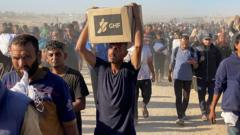Witnesses report brutal scenes of chaos and violence after Israeli troops opened fire on Palestinians seeking food aid, raising serious concerns about the efficacy and humanitarian appropriateness of the newly established Gaza Humanitarian Foundation's aid distribution strategy.
Deadly Violence at Gaza Aid Distribution Sparks Outrage Against Israel's Humanitarian Strategy

Deadly Violence at Gaza Aid Distribution Sparks Outrage Against Israel's Humanitarian Strategy
Recent killings of civilians at a Gaza aid center intensify criticisms of Israel's controversial new distribution system.
In the early hours before dawn on Tuesday, reports emerged of severe violence as Israeli troops fired upon Palestinians gathering for food aid at a new distribution point in Gaza. Accounts from witnesses and international medical teams described the scene as "total carnage," starkly contrasting the Israeli military's official narrative, which suggested that they responded to "suspects" deviating from designated routes.
This tragic incident marks yet another chapter in the ongoing debate regarding Israel's recently implemented aid distribution system, designed to replace efforts led by United Nations agencies and seasoned international aid organizations. The Gaza Humanitarian Foundation (GHF), a new private initiative supported by the United States, employs armed security teams at its aid hubs situated in southern Gaza, an area under full Israeli military control.
The GHF's inception came after Israel imposed a strict ban on food and aid shipments into Gaza, leaving residents vulnerable to dire food shortages. Israeli officials have alleged that Hamas has pilfered much of the aid previously distributed by UN staff, a claim that the UN has vehemently denied, affirming their capacity to supervise and account for all aid provided.
Reports evaluating the GHF's processes highlight significant flaws that have raised concerns among aid professionals. Jake Wood, who led GHF, resigned recently, citing an inability to uphold essential humanitarian principles of neutrality and independence.
Previously, the UN managed a comprehensive network of distribution points catering to hundreds of thousands, providing essential supplies for communal kitchens and bakeries. The GHF, however, requires individuals to navigate perilous conditions in war-torn southern Gaza to access limited rations. The chaotic distribution has often led to stronger individuals seizing aid intended for vulnerable families, resulting in inadequate supplies for those in dire need.
The dangerous environment has forced many Palestinians to crowd at distribution centers, further escalating the risk of violent confrontations. Following a recent surge in tensions, Israeli troops opened fire, leading to significant civilian casualties.
In a prior interview, the UN High Commissioner for Human Rights, Volker Türk, criticized the GHF framework, arguing it disregards civilian safety and creates impossible circumstances for those desperately seeking food and medical assistance. He condemned Israel's actions as a breach of wartime laws, emphasizing the urgency for appropriate humanitarian intervention.
Despite the arguments in favor of the GHF as a stopgap solution, critics contend that the system serves as a method for controlling Palestinian civilians, with Israeli leaders openly discussing the use of food aid as a strategic weapon against Hamas.
As international allies of Israel, including the UK, France, and Canada, call for immediate reforms in Israel's approach to Gaza, the moral and humanitarian implications of the GHF initiative grow increasingly evident. These allies are prepared to take decisive action, including sanctions and recognition of a Palestinian state, should Israel continue its current course amidst the mounting outcry over the deaths of innocent civilians.




















